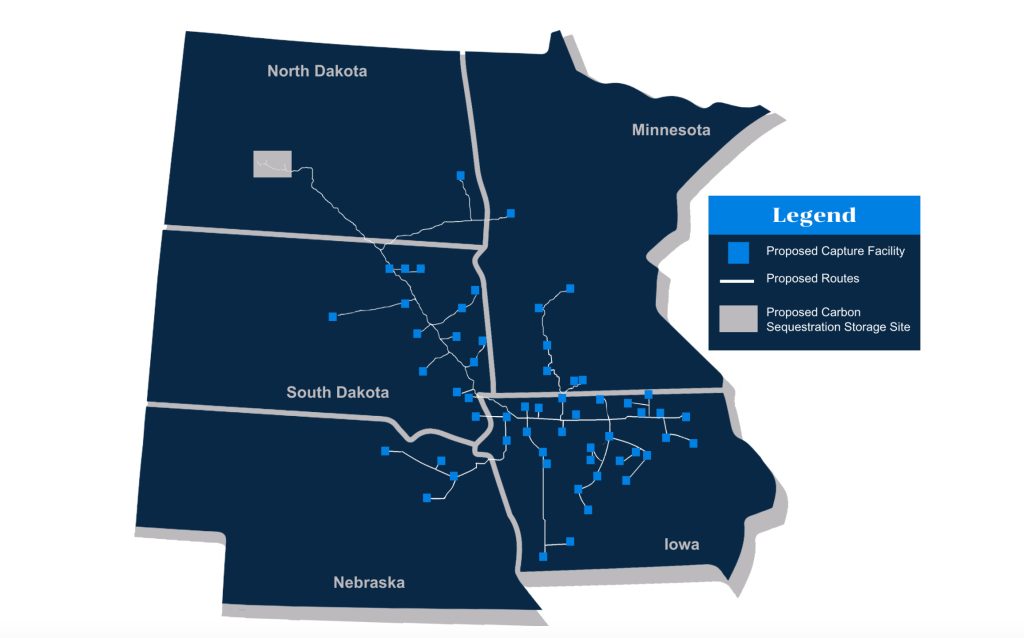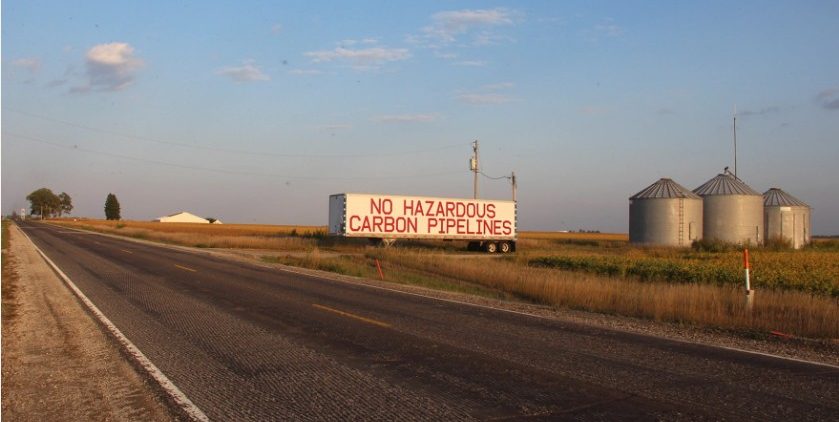No surrendering for lawmakers, citizen groups, carbon sequestration company
PIERRE, S.D. – Even as state regulators dealt another blow to Summit Carbon Solutions’ plans in South Dakota, work is not finished on both sides of the carbon dioxide transport fight.
Last week, Lincoln County commissioners approved one of the state’s toughest local ordinances regulating carbon pipelines, hours before the Public Utilities Commission (PUC) rejected Summit’s request for more time to make its project viable. The two decisions mark a turning point in a years-long showdown between corporate infrastructure ambitions and local landowner rights.
The 3-2 vote in Lincoln County capped more than two years of committee work, public hearings and citizen engagement. The ordinance sets stringent setbacks, mandates public access to safety data and imposes annual fees on pipeline operators.
“This was a grassroots-driven ordinance from day one,” Commissioner Jim Schmidt said. “It reflects the will of Lincoln County residents and empowers them to have a say in what gets built in their own backyards.”
The ordinance requires carbon dioxide pipelines to be built at least 500 feet from property lines and above-ground facilities to be over a quarter-mile from homes or public spaces. It also obliges companies to submit unredacted plume dispersion models and bury pipelines at least seven feet underground. Municipalities retain the power to block pipeline development within city limits, and pipeline companies must pay $5 per linear foot annually to cover county oversight costs.

While no opponents testified at the meeting, Commissioners Joel Arends and Tiffani Landeen voted against the ordinance, warning that certain provisions — especially safety requirements — may be challenged in court under federal preemption laws.
“I like the setbacks. I like the depth of cover,” Arends said. “But counties are not permitted under the United States Constitution to regulate pipelines on the basis of safety.”
Despite legal uncertainty, local activists say the ordinance represents a significant victory for landowner rights.
“By incorporating this language, you save the county hundreds of battles in the future,” said rural resident Tony Ventura. “It’s imperative to protect citizens on both sides of the fence.”
Meanwhile, Summit Carbon Solutions’ proposed carbon pipeline — meant to transport carbon captured from regional ethanol plants to underground storage sites in North Dakota — remains stalled after the PUC denied the company’s request for an indefinite extension on its siting permit.
PUC Chair Gary Hanson and Commissioner Kristie Fiegen cited the company’s inability to secure easements without eminent domain, which the state banned earlier this year under House Bill 1052. The law, signed by Gov. Larry Rhoden in March, prohibits using eminent domain for carbon pipelines.
“The current route is not viable,” Fiegen said Tuesday.
The company had argued that it needed more time to adjust its plans and pursue voluntary easements with landowners now that the threat of eminent domain had been removed. But Fiegen and Hanson found that Summit failed to demonstrate progress toward making the route proposed through South Dakota palatable to landowners who have vowed never to volunteer their property for the project.
“The Summit team includes many people doing many things,” a company attorney told commissioners when asked what progress had been made since the law passed. “I can’t quantify those today.”
Landowners and advocacy groups hailed the decision as a victory for private property and democratic accountability.
“Today is a victory for South Dakota landowners and local control,” said Ed Fischbach, a board member with Dakota Rural Action and outspoken opponent of the pipeline. “The PUC has acknowledged that the company has run out of road to build this pipeline.”
Attorney Brian Jorde, who represents landowners with the South Dakota Easement Team, urged Summit to respect the PUC decision and avoid federal litigation over route preemption.
“Hopefully, Summit will once and for all truly reset and not quadruple down on their failed tactics,” Jorde said.
Despite the regulatory hurdles, Summit insists the project isn’t dead.
“We remain committed to South Dakota,” company spokesperson Sabrina Zenor said in a statement. “We will refile an application that reflects a reduced scope and continued engagement with landowners and plant partners.”
But with counties like Lincoln tightening local controls and others, like Lake County, seeing citizen-led efforts to ban pipelines altogether, the road ahead for Summit appears increasingly narrow.
Schmidt also referenced Lake County, where commissioners have opted not to adopt regulations favored by Summit adversaries.
“There is a citizens’ group that is going to force this to a public vote. They are collecting signatures, and theirs isn’t going to be an ordinance like this one in front of us today. It’s going to be a flat blanket, ‘no, we don’t want a pipeline in Lake County,’ period,” said the longtime county official.
“Our permits are not for sale,” said Sen. Joy Hohn, whose family farm was in the proposed pipeline’s path. “The PUC decision proves that in South Dakota, big corporations don’t get to mistreat citizens and expect to be rewarded.”


